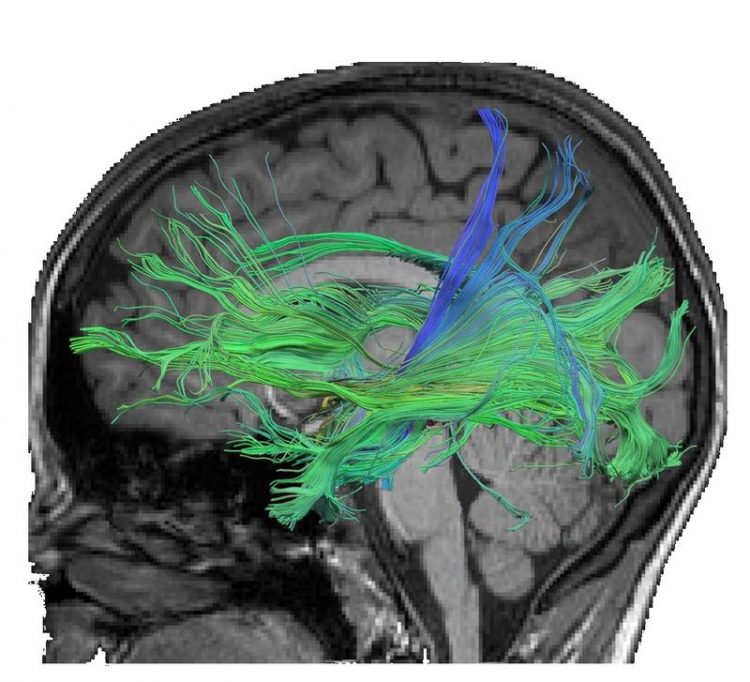The plastic brain: Better connectivity of brain regions with training

Fiber connections associated with the retrieval of numeric facts. Media-based training strengthened the conductivity of the fibers connected to long-term memory. Leibniz-Institut für Wissensmedien (IWM)
No matter whether a person learns new knowledge or a new body movement – synapses, nerve cell connections and entire brain areas, i.e. the function and structure of the brain, do always change.
The human brain remains “plastic” for a lifetime, i.e. it is able to change. Researchers led by Dr. Dr. Elise Klein at the Leibniz-Institut für Wissensmedien (IWM) have investigated functional and structural changes of the brain as consequence of media-based numerical learning. It seems obvious that arithmetic training has an impact on our ability to calculate.
The study demonstrated this on a neuronal level: The calculation training changed the network of brain areas that was activated when solving math calculations. However, the study has now also revealed structural changes in the brain as a result of calculation training – and thus anatomical changes in the neuronal network.
The findings indicate how learning processes manifest themselves in the brain and show the potential of neurocognitive plasticity in adulthood.
The calculation training not only successfully improved the performance of the participants, the researchers from Tübingen also succeeded in determining how this learning process takes place on a neuronal level. In a previous study, they had already observed that training increases functional activation in brain areas associated with the retrieval of arithmetic facts from long-term memory (e.g. hippocampus). By using diffusion-weighted magnetic resonance imaging, the researchers have now been able to show that the training also strengthened the structural connection between these areas which led to a successful learning process. “The neuronal plasticity following media-based training was already evident after only five training units,” says Elise Klein from the IWM.
“This change at the neuronal level indicates that even short cognitive training sessions can induce plastic processes in the brain. The selectivity of the neurostructural changes, in turn, gives insight into the processing of arithmetical facts in the brain.” The findings not only indicate how learning processes manifest themselves in the brain, but also show the potential of neurocognitive plasticity in adulthood.
Korbinian Moeller, head of the Junior Research Group Neuro-cognitive Plasticity, comments on the results of the study: “The study improves our understanding of the neuronal foundations of numerical learning and of the possibilities of neuronal reorganisation in the brain. The results can be used to develop interventions for children with learning disabilities and for patients with arithmetic difficulties after brain damage.”
Results of the study have been published in the renowned journal “Cortex”.
More Information:
Dr. Dr. Elise Klein
NG Neuro-cognitive Plasticity
Phone: +49 7071 979-205
Email: e.klein@iwm-tuebingen.de
Press:
Mira Keßler
Press Department
Phone: +49 (0) 7071 979-222
Email: presse@iwm-tuebingen.de
Since April 2015, Elise Klein has been working at the IWM in the junior research lab Neuro-cognitive Plasticity within the Wrangell Habilitation Programme. The researchers of the lab are particularly interested in the neural foundations of knowledge acquisition and knowledge application. The topical focus of the junior research group is on numerical cognition with particular interest being paid to the neural correlates of number processing as well as its development during childhood.
Media Contact
More Information:
http://www.iwm-tuebingen.deAll latest news from the category: Communications Media
Engineering and research-driven innovations in the field of communications are addressed here, in addition to business developments in the field of media-wide communications.
innovations-report offers informative reports and articles related to interactive media, media management, digital television, E-business, online advertising and information and communications technologies.
Newest articles

NASA: Mystery of life’s handedness deepens
The mystery of why life uses molecules with specific orientations has deepened with a NASA-funded discovery that RNA — a key molecule thought to have potentially held the instructions for…

What are the effects of historic lithium mining on water quality?
Study reveals low levels of common contaminants but high levels of other elements in waters associated with an abandoned lithium mine. Lithium ore and mining waste from a historic lithium…

Quantum-inspired design boosts efficiency of heat-to-electricity conversion
Rice engineers take unconventional route to improving thermophotovoltaic systems. Researchers at Rice University have found a new way to improve a key element of thermophotovoltaic (TPV) systems, which convert heat…



